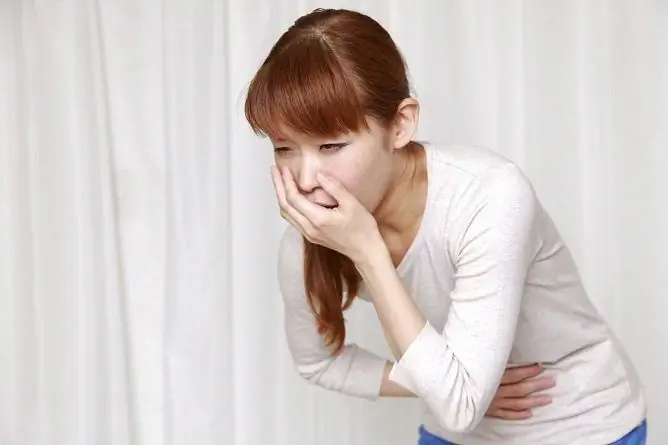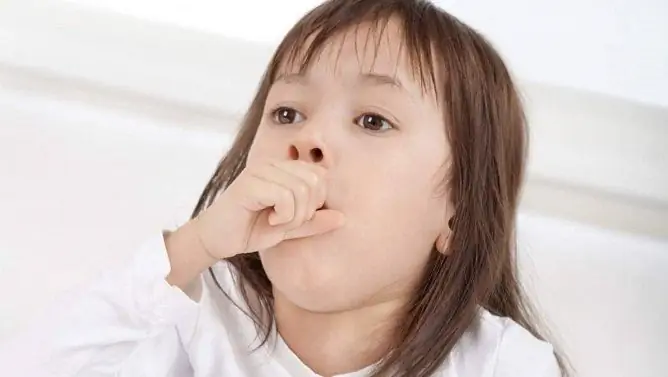- Author Rachel Wainwright wainwright@abchealthonline.com.
- Public 2023-12-15 07:39.
- Last modified 2025-11-02 20:14.
Allergic cough in adults: symptoms, causes, diagnosis and treatment
The content of the article:
- Signs of an allergic cough in adults
- Causes and risk factors
- How to determine the allergic nature of a cough
- How to treat an allergic cough in adults
- Treatment of allergic cough in adults with folk remedies
- Other recommendations for patients with allergic cough
- Video
Symptoms of allergic cough in adults, as well as in children, should not be ignored, as this can cause the development of bronchial asthma.
Allergy is one of the types of immune hypersensitivity in humans. It can manifest itself as rashes and itchy skin, angioedema, increased lacrimation, liquid and profuse discharge from the nasal cavity, as well as an allergic cough, which is caused by edema of the mucous membrane of the trachea and bronchi.

Allergic cough is often accompanied by other manifestations of allergies
Allergic cough is usually aggravated in the evening and at night, there are no signs of a cold (body aches, chills, etc.). Its similarity to the cough in bronchial asthma is that it is dry and can appear at night. The difference is that allergic cough is not accompanied by asthma attacks characteristic of bronchial asthma.
Signs of an allergic cough in adults
The appearance of certain allergy symptoms depends on the nature of the substance that causes the development of the pathological process, as well as on the degree of sensitization. So, in some patients, the ingestion of an allergen on the skin immediately causes skin flushing, itching, and a rash. When the allergen is inhaled, the patient develops coughing, sneezing, watery eyes, and nasal discharge. The allergic process can manifest itself as a sore throat, which can be mistaken by the patient for manifestations of an acute respiratory illness. It is possible to differentiate an allergic cough from that of a cold by the absence of an elevated temperature, which often accompanies respiratory infections.
Allergic cough is most often paroxysmal, appears suddenly. At the end of a coughing attack, clear sputum may be released, there are no impurities in it. An allergic cough can last for a long time, but it stops quickly after contact with the allergen stops.
With an allergic cough, a child has dry coughing more often, severe attacks are extremely rare. In adults, however, such a cough often takes on a debilitating character, there are bouts of barking cough.
Causes and risk factors
According to statistics, one or another type of allergic reaction is observed in about 80% of the population, and the first symptoms of allergy in children appear from 1-2 years old.
An allergic cough develops when an allergen enters the patient's airways. This causes irritation of the mucous membranes of the respiratory tract, which, in turn, causes a cough. A cough can develop in response to household dust entering the human respiratory tract, which contains a large number of microscopic mites, cigarette smoke, fumes from household chemicals, plant pollen, animal hair, food for aquarium fish, inhalation drugs.
An allergic cough can develop when moving to another climatic zone, introducing new, especially exotic products into the diet, the appearance of pets, the use of wool, fluff and / or fur products, the use of household chemicals, new brand cosmetics, construction work.
Seasonal exacerbations of allergic coughing attacks (usually in spring and summer) may indicate the development of bronchial asthma.
How to determine the allergic nature of a cough
If you have frequent coughing fits, you need to see a doctor and get tested. To determine the allergic nature of cough, they usually use the data obtained during the collection of complaints and anamnesis, an objective examination, and laboratory studies.
To carry out a nasal test, a certain amount of the allergen is injected into the patient's nasal passages. Skin testing for an allergen can be done in several ways. When performing a prick test, a liquid substance (suspected allergen) is applied to the skin, after which the skin is punctured with a special needle to a certain depth. When using the scarification method, an allergen is applied to the skin of the forearm, after which paired scarification (scratches) of the skin are made with a sterile instrument. For a cutaneous test, dressings with a liquid allergen are usually used, which are fixed on the skin of the patient's back.
A week before the skin tests, you must stop taking all antiallergic medicines. The study is usually carried out in the period of remission of the disease of allergic etiology.

Skin allergy tests help identify the allergen, the elimination of which will alleviate the condition
Contraindications to skin tests may be the stage of exacerbation of allergies, acute respiratory diseases, tuberculosis during the exacerbation, a number of diseases of the cardiovascular system, kidneys, liver in the stage of decompensation, prolonged use of corticosteroids, pregnancy.
A false positive result of a skin test can be obtained if the patient has an increased sensitivity of the skin to mechanical irritation, preservatives, in case of improper storage of the allergen, which entailed a change in its properties.
False negative results can be obtained if the patient uses antihistamines, corticosteroids, dehydration of the body, exposure to ultraviolet radiation, circulatory disorders.
How to treat an allergic cough in adults
First of all, it is necessary to determine the substance that causes the development of an allergic reaction, and to exclude contact with it. This may be sufficient to stop coughing and other manifestations of allergies.
As part of drug therapy, antihistamines are prescribed. It should be borne in mind that some drugs from this group have a sedative effect. After taking the drug, the patient may experience drowsiness, lethargy, headache, and decreased attention. For this reason, such drugs should be taken with caution in patients whose work activity requires concentration, quick reaction and / or is associated with the management of highly complex or dangerous mechanisms.
In case of exacerbations of allergies and the development of cough, enterosorbents can be used, which absorb and remove toxins from the gastrointestinal tract.
With an allergic cough, which is accompanied by suffocation, drugs with a bronchodilator effect can be used.
You can take any remedies for allergic cough only after consulting your doctor. It is not recommended to change the dosage and / or frequency of use of the prescribed drug.
You can use inhalation to reduce the frequency of relapses of allergic cough. In this case, both steam and inhalation can be carried out using a nebulizer.
A severe allergic reaction may require plasmapheresis or hemodialysis.
If the patient has a food allergy, foods that are potential allergens should be removed from the diet. It is recommended to consume more calcium-rich hypoallergenic foods and drink more liquid - dried fruit compote or still water.
Treatment of allergic cough in adults with folk remedies
Before you start treating allergies with folk remedies, you need to consult with your doctor. This is due to the fact that many medicinal plants, contrary to the popular opinion about their complete safety, are strong allergens, and may not alleviate, but complicate the patient's condition.
For dry allergic cough, eucalyptus, nettle, yarrow are often used, which are brewed and drunk in the form of tea. Infusions and decoctions of medicinal herbs such as wild rosemary, coltsfoot, violet, sage, St. John's wort, chamomile can be used.
For painful coughing fits, potato inhalation is recommended. To do this, boil a few washed but unpeeled potatoes, sprinkle them with 2-3 pinches of baking soda. Breathe steam over a container of potatoes for 10-15 minutes, covering your head with a towel. After carrying out this procedure, the patient needs to be warm, not to go directly into the cold air.
Patients with allergic cough should rinse their mouth several times a day (especially after returning from the street). You can also rinse the nasopharynx with warm water 1-2 times a day. For these purposes, in addition to water, you can use a baking soda solution (1 teaspoon of the substance per glass of warm water).
Other recommendations for patients with allergic cough
It is necessary to get rid of bad habits, especially from smoking.

Highly allergenic foods should be excluded from the diet.
It is necessary to carry out regular wet cleaning of living quarters, ventilation and air ionization. You should get rid of feather pillows, preferring hypoallergenic ones made of synthetic materials. Bed linen should be washed once every 1-2 weeks at a high temperature.
It is recommended to use cabinet furniture with closed doors, as dust accumulates on open shelves, which serves as a strong allergen.
If the allergen is spread by pets, it is advisable to part with them. If this is not possible, increased attention should be paid to the hygiene of pets, more often to wet cleaning the living space.
If the reason for the development of allergies is the presence of occupational hazards, the patient may be advised to change the place of work.
If possible, during the flowering of plants, the pollen of which causes allergies, the patient should move to another area.
Video
We offer for viewing a video on the topic of the article.

Anna Aksenova Medical journalist About the author
Education: 2004-2007 "First Kiev Medical College" specialty "Laboratory Diagnostics".
The information is generalized and provided for informational purposes only. At the first sign of illness, see your doctor. Self-medication is hazardous to health!






